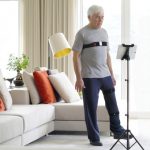 Rehabilitation has been one of the more active areas of innovation in healthcare in recent years. For instance, TickerFit are a service that aim to provide personalized coaching support to help people during their rehab. Or you’ve got ImmersiveRehab, who are a VR-based platform that use virtual gaming type exercises to help guide people through their rehab. Similar ‘exergaming‘ platforms have emerged that take advantage of consumer technology, such as the Nintendo Wii. There has even been a zero gravity treadmill developed to support people through their rehab.
Rehabilitation has been one of the more active areas of innovation in healthcare in recent years. For instance, TickerFit are a service that aim to provide personalized coaching support to help people during their rehab. Or you’ve got ImmersiveRehab, who are a VR-based platform that use virtual gaming type exercises to help guide people through their rehab. Similar ‘exergaming‘ platforms have emerged that take advantage of consumer technology, such as the Nintendo Wii. There has even been a zero gravity treadmill developed to support people through their rehab.
Most of these approaches aim to use remote technologies to track and guide the movements of the patient, but there are also technologies that model themselves on the wearable technologies commonly used by amateur athletes. For instance, an Australian team have developed a Fitbit style device that can track the biomechanics of the wearer, with the team explicitly targeting the healthcare market.
“BioKin was created to help doctors and clinicians better monitor the progress of patients with balance disorders, recovering from strokes, living with Parkinson’s disease, or regaining movement after surgery,” they say. “The small, light units provide incredibly accurate data – pinpointing movement to a greater accuracy – that give a really clear picture of how a patient is progressing with their rehab.”
Modern physiotherapy
SWORD Health are arguably the most advanced in terms of bringing this kind of approach to market. The company’s SWORD Phoenix platform is billed as the world’s first digital physiotherapist and combines motion tracking sensors with advanced AI to provide users with personalized and precise rehabilitation support from the comfort of their own home.
The platform was analyzed in a recently published paper, which revealed that 93% of patients using the platform saw an improvement in their motor abilities. This kind of accredited success has seen the technology deployed by healthcare providers in the United States, Australia and Portugal, with some 93,000 sessions supported to date.
The team hope to perform a second study on the commercial application of the technology, with the paper due to be published later this year. With so much activity in the space however, it’s perhaps never been a better time to be going through rehabilitation.